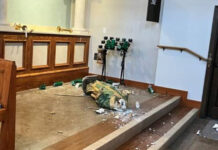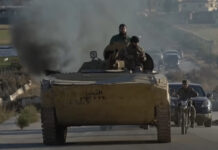On 9 February this year, Nicaragua removed 222 political prisoners from prison – including several Christians – stripped them of their citizenship and sent them into exile in the United States. Yet Bishop Rolando José Álvarez Lagos was not one of them. He refused to be expelled from Nicaragua, and the very next day received a shocking sentence: more than 26 years in prison, on unfounded charges.
Bishop Álvarez has a history of being targeted by the government because he has been a vocal critic of human rights abuses committed under the government of President Daniel Ortega. Last August, he was one of 12 people forcibly confined in the Diocese of Matagalpa curia, including priests, seminarians and church cameramen.
The curia was surrounded by heavily armed security forces for two weeks starting on 4 August, preventing anyone from leaving or entering.
In an amazing response of faith, Bishop Álvarez approached the officers, singing and praying for them, and asking them to reconsider their actions. But still no one was allowed to leave.
‘God is with us’
For 15 days the group was blockaded inside the curia, yet they boldly continued to hold Mass and broadcast it live on social media.
‘We are not alone, here in the Episcopal Curia of Matagalpa,’ said the bishop in one online service. ‘God is with us. We are not alone. You are with us… ‘There is a multitude of angels accompanying us, but also a multitude, you, who express prayer and supplication and all of those who have written to us…’
After 15 days, security forces stormed the curia and made arrests. Seven people, including priests and seminarians, were taken to a maximum-security prison, while Bishop Álvarez was placed under house arrest.
Prison or exile
On 9 February, the Nicaraguan government announced the release of 222 political prisoners, but immediately deported them to the US and stripped them of their citizenship – which violates international law. Among them were seven of those confined in the curia last August. But why not Bishop Álvarez?
Despite pressure from the government, Bishop Álvarez refused to board the plane leaving Nicaragua to go into exile and was transferred from house arrest to a maximum prison. The next day, he was sentenced to over 26 years in prison on unfounded charges of conspiracy and spreading false information. He is being held in solitary confinement in a punishment cell with very little light.
‘It is clear from the timing and severity of the sentence that the treatment of Bishop Álvarez is in direct retaliation for his refusal to leave Nicaragua.’ said Anna Lee Stangl, CSW’s Head of Advocacy.
Why was Bishop Álvarez targeted?
Bishop Álvarez should never have been arrested at all, let alone forced to choose between continued imprisonment or exile. He is one of many brave Nicaraguans who dare to defend human rights and speak out against authoritarian rule.
Over the past five years, President Daniel Ortega has cracked down on independent voices as he consolidates power. This escalated dramatically in 2022, with religious leaders being a particular target, especially those the government views as critical of its policies.
David, an exiled human rights defender, told CSW: ‘The dictatorship dominates the radio and television media… It has eliminated religious channels and radio stations little by little. It has done the same thing with private radio stations in order that what is really happening in the country goes unreported.’
And it seems that this is the reason for the police action on the curia of Matagalpa last August. On 1 August – three days before the blockade began – eight Roman Catholic radio stations were ordered to stop broadcasting immediately. The forced closure was based on a claim that the stations had not held valid permits since 2003. This was untrue, and Bishop Álvarez had in fact provided the required documentation to the authorities in 2016, but his requests for official acknowledgement went unanswered.
Wider crackdown on civil society
Thousands of other civil society organisations arbitrarily lost their legal status last year, including faith-based groups, independent television stations and charities; many of them supported vulnerable communities in Nicaragua.
As you’ll read on p.10 of Response, those in power sometimes see civil society as a threat, despite or perhaps because of the important work these groups do.
President Ortega is going to great lengths to silence independent voices and hide the truth of his actions from his own people and the rest of the world. As David said, ‘He wants to give countries abroad the impression that everything is in order and that there is no problem in Nicaragua.’
However, the fact that you’re reading this article shows that this cover-up is not succeeding; the truth is being heard. We are thankful for our contacts who choose to keep reporting the human rights situation in Nicaragua, despite the significant risks, to make sure that the world sees and holds President Ortega to account.
And as Bishop Álvarez said: the people of Nicaragua living under oppression are not alone. There is indeed a multitude of people standing in solidarity, through prayer, letterwriting, giving, and many other ways, seen or unseen. Thank you for being one of the multitude. — Christian Solidarity Worldwide
At a glance
- Over 328,000 Nicaraguans left the country in 2022 (4.9% of the population)
- Over 3,200 non-governmental organisations have been forced to close since 2018.
- Nicaragua is a majority Christian country with Roman Catholics making up about 43% of the population and Protestants 41%. President Ortega and his government view religious leaders as a particular potential threat because of the significant influence they have in the population.
Take action:
- Pray using p.8 of the Prayer Diary.
- Write to Bishop Álvarez in prison: csw.org.uk/ConnectEncourage
- Share what you’ve read with someone else.






